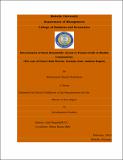| dc.description.abstract | The provision of credit has increasingly been regarded as an important tool for raising the
income of the rural population, mainly by mobilizing resources to more productive use.
However, in Ethiopia, among other things, lack of finance is one of the fundamental problems
impeding production, productivity and income of the rural households in general and food
insecure household in particular. The Federal and Regional governments have been making
different efforts to address the overwhelming problem of food insecurity by providing food
security package based credit and other complementing services. Although credit facilities are
available to rural households in the study area, in practice, some Muslim households made use
of the facility while many others have not. The purpose of this study is to assess the factors that
determine rural Muslim households' access to formal credit in the study area. A two stage
sampling method was employed to select two out of eighteen rural peasant associations and 150
Muslim rural households (80 credit user and 70 non users). Both quantitative and qualitative
data were collected from the households using a structured questionnaire, focus group
discussions and field observation. Descriptive statistics and binary logistic regression model
were employed to analyze the data. The result revealed that, 65.7 percent of the non credit user
households displayed the need for credit. Some 40 percent of those who confirmed the need for
credit indicated the presence of interest, which is not supported by Islam, as the main
impediment for not borrowing from microfinance institutions. Moreover, rural households who
participate in extension package program have significantly more access to microfinance loans
than non participants. Besides, problems related to group formation and lack of own cultivated
land significantly affected participation in formal credit. While access to credit is quite crucial
for poverty alleviation, the findings of this study show that policy makers as well as
governmental and non-governmental development actors need to pay due attention to promote
and enhance access to credit of rural Muslim households. | en_GB |


